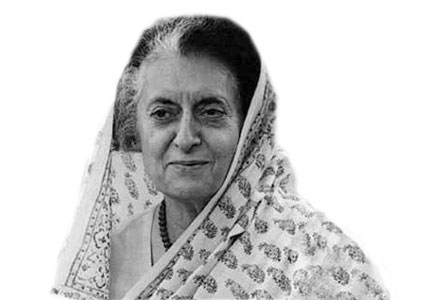
“People tend to forget their duties but remember their rights.”
(Indira Gandhi)
Known as the women of Millennium, Indira Gandhi was the first
woman Prime Minister and one of the most powerful prime ministers
this country has seen. As a prime Minister, she was known for
her political hardheartedness and exceptional centralization
of power.
She was born in November 19, 1917 in Allahabad, in the state
of Uttar Pradesh. She was the only child of Jawaharlal Nehru,
the first Prime Minister of India and Kamala Nehru. Born into
such a distinguished political family, Indira moved towards
politics. She was a great crusader of world peace. Indira started
his political career when she turned twelve years of age. When
she was just 13 years old, Indira organized a 'Monkey Army'
(Vanar Sena) comprising of young teenagers which proved her
intention to fight for the independence of her country.
She completed her studies in Oxford University. In 1938, she
joined Indian National Congress, something she always wanted
to do. She had been married in 1942 to Feroze Gandhi, a parliamentarian
and prominent politician. The same year both of them got jailed
during the freedom movement. Two sons were born to her- Rajiv
Gandhi and Sanjay Gandhi.
After Independence, when her father, Jawahar Lal Nehru became
the prime minister of India, Indira started serving her father
unofficially as a personal assistant. After Nehru's death, Indira
appointed as a member of Rajya Sabha and became Minister of
Information and Broadcasting under Lal Bahadur Shastri's Ministry.
In 1966, after death of Lal Bahadur Shastri, congress officially
elected Indira Gandhi as the prime minister of India. But in
1969, Congress split in to two as the socialists led by Indira,
and the conservatives led by Morarji Desai. Indira Gandhi's
leadership and administration skill surprised even the senior
leaders of congress. Indira reached the acme of her popularity
after India's decisive victory over Pakistan in the 1971 war.
Indira tried to keep a close relation with Soviet Union and
other neighbouring countries of India such as Bangladesh, Sri
Lanka etc
In 1975, her election to Parliament was declared invalid and
she declared internal emergency. During this period, Gandhi
granted herself extraordinary powers and launched a massive
crackdown on civil liberties and political opposition. Most
of her political opponents were imprisoned and the press was
censored. But Emergency led to her with her son Sanjay Gandhi
defeat in 1977 elections.
Indira Gandhi returned to power in 1980 with an overwhelming
majority. Gandhi presided over three five year plans as prime
minister. To deal with India's food problems, Gandhi introduced
Green Revolution in India, to pursue agricultural self-sufficiency.
Mrs Gandhi, served as prime minister from 1966 to 1977 and
then again from 1980 until her assassination in 1984. Being
a central figure of Indian National Congress, Indira Gandhi
was one of the most efficient Prime Ministers of India and was
credited with great achievements. Noteworthy among them are
nationalization of banks, liberation of Bangladesh and 20 point
program for the upliftment of the poor. She was honoured with
'Bharat Ratna' in 1971.
In 1984, June 3- 8, Indira Gandhi ordered for a military operation
named Operation Blue star to eliminate Jarnail Singh Bhindranwale
and his followers who had sought cover in the Amritsar Harmandir
Sahib Complex, Punjab. Military officials attacked Harmandar
Sahib, popularly known as the Golden Temple in Amritsar, where
militants were hiding with heavy ammunition. Operation Bluestar
left nearly 600 people, including army personnel, militants
and civilians dead.
Mrs. Gandhi, met her tragic end on 31st October 1984, when
she was brutally assassinated by her own guards who were upset
over her government's actions in Punjab.

